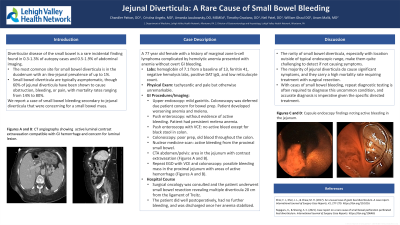Sunday Poster Session
Category: Small Intestine
P1312 - Jejunal Diverticula: A Rare Cause of Small Bowel Bleeding
Sunday, October 22, 2023
3:30 PM - 7:00 PM PT
Location: Exhibit Hall

Has Audio
- CP
Chandler Patton, DO
Lehigh Valley Health Network
Allentown, PA
Presenting Author(s)
Chandler Patton, DO, Cristina Angelo, MD, Anam Malik, MD, Amanda Jacubowsky, DO, MSMEd, Timothy Graziano, DO, Neil Patel, DO, William Ghaul, DO
Lehigh Valley Health Network, Allentown, PA
Introduction: Diverticular disease of the small bowel is a rare incidental finding found in 0.3-1.3% of autopsy cases and 0.5-1.9% of abdominal imaging. The most common site for small bowel diverticula is in the duodenum with an ileo-jejunal prevalence of up to 1%. Small bowel diverticula are typically asymptomatic, though 60% of jejunal diverticula have been shown to cause obstruction, bleeding, or pain, with mortality rates ranging from 14% to 80%.
Case Description/Methods: A 77 year old female with a history of marginal zone b-cell lymphoma complicated by hemolytic anemia, presented with anemia without overt GI bleeding. Labs on presentation noted a hemoglobin of 7.1 from a baseline of 13, ferritin 41, negative hemolysis labs, positive DAT IgG, and low reticulocyte count. Upper endoscopy showed mild gastritis. Colonoscopy was deferred due to not being able to tolerate bowel preparation. Due to worsening anemia and new onset melena, push enteroscopy was performed without evidence of active bleeding. Given persistent melena and requirement of transfusions, repeat push enteroscopy with VCE revealed no active bleed except for black stool in colon. Colonoscopy was then performed noting poor prep and old blood throughout the colon. A nuclear medicine scan showed active bleeding from the proximal small bowel, with follow up CTA abdomen/pelvis noting an area in the jejunum with contrast extravasation. Repeat EGD with VCE and colonoscopy were performed showing a possible bleeding mass in the proximal jejunum with areas of active hemorrhage. Surgical oncology was consulted and the patient underwent small bowel resection revealing multiple diverticula 20 cm from the ligament of Treitz (Figures A and B). The patient did well postoperatively, had no further bleeding, and was discharged once her anemia stabilized.
Discussion: This case discusses a patient who underwent extensive workup for obscure GI bleeding and was found to have active jejunal diverticular bleeding on VCE and intraoperatively. The rarity of small bowel diverticula, especially with location outside of typical endoscopic range, make them quite challenging to detect if not causing symptoms. However, the majority of jejunal diverticula do cause significant symptoms, and they carry a high mortality rate requiring treatment with surgical resection. With cases of small bowel bleeding, repeat diagnostic testing is often required to diagnose this uncommon condition, and accurate diagnosis is imperative given the specific directed treatment.

Disclosures:
Chandler Patton, DO, Cristina Angelo, MD, Anam Malik, MD, Amanda Jacubowsky, DO, MSMEd, Timothy Graziano, DO, Neil Patel, DO, William Ghaul, DO. P1312 - Jejunal Diverticula: A Rare Cause of Small Bowel Bleeding, ACG 2023 Annual Scientific Meeting Abstracts. Vancouver, BC, Canada: American College of Gastroenterology.
Lehigh Valley Health Network, Allentown, PA
Introduction: Diverticular disease of the small bowel is a rare incidental finding found in 0.3-1.3% of autopsy cases and 0.5-1.9% of abdominal imaging. The most common site for small bowel diverticula is in the duodenum with an ileo-jejunal prevalence of up to 1%. Small bowel diverticula are typically asymptomatic, though 60% of jejunal diverticula have been shown to cause obstruction, bleeding, or pain, with mortality rates ranging from 14% to 80%.
Case Description/Methods: A 77 year old female with a history of marginal zone b-cell lymphoma complicated by hemolytic anemia, presented with anemia without overt GI bleeding. Labs on presentation noted a hemoglobin of 7.1 from a baseline of 13, ferritin 41, negative hemolysis labs, positive DAT IgG, and low reticulocyte count. Upper endoscopy showed mild gastritis. Colonoscopy was deferred due to not being able to tolerate bowel preparation. Due to worsening anemia and new onset melena, push enteroscopy was performed without evidence of active bleeding. Given persistent melena and requirement of transfusions, repeat push enteroscopy with VCE revealed no active bleed except for black stool in colon. Colonoscopy was then performed noting poor prep and old blood throughout the colon. A nuclear medicine scan showed active bleeding from the proximal small bowel, with follow up CTA abdomen/pelvis noting an area in the jejunum with contrast extravasation. Repeat EGD with VCE and colonoscopy were performed showing a possible bleeding mass in the proximal jejunum with areas of active hemorrhage. Surgical oncology was consulted and the patient underwent small bowel resection revealing multiple diverticula 20 cm from the ligament of Treitz (Figures A and B). The patient did well postoperatively, had no further bleeding, and was discharged once her anemia stabilized.
Discussion: This case discusses a patient who underwent extensive workup for obscure GI bleeding and was found to have active jejunal diverticular bleeding on VCE and intraoperatively. The rarity of small bowel diverticula, especially with location outside of typical endoscopic range, make them quite challenging to detect if not causing symptoms. However, the majority of jejunal diverticula do cause significant symptoms, and they carry a high mortality rate requiring treatment with surgical resection. With cases of small bowel bleeding, repeat diagnostic testing is often required to diagnose this uncommon condition, and accurate diagnosis is imperative given the specific directed treatment.

Figure: Figures A and B: Capsule endoscopy findings noting active bleeding in the jejunum
Disclosures:
Chandler Patton indicated no relevant financial relationships.
Cristina Angelo indicated no relevant financial relationships.
Anam Malik indicated no relevant financial relationships.
Amanda Jacubowsky indicated no relevant financial relationships.
Timothy Graziano indicated no relevant financial relationships.
Neil Patel indicated no relevant financial relationships.
William Ghaul indicated no relevant financial relationships.
Chandler Patton, DO, Cristina Angelo, MD, Anam Malik, MD, Amanda Jacubowsky, DO, MSMEd, Timothy Graziano, DO, Neil Patel, DO, William Ghaul, DO. P1312 - Jejunal Diverticula: A Rare Cause of Small Bowel Bleeding, ACG 2023 Annual Scientific Meeting Abstracts. Vancouver, BC, Canada: American College of Gastroenterology.
